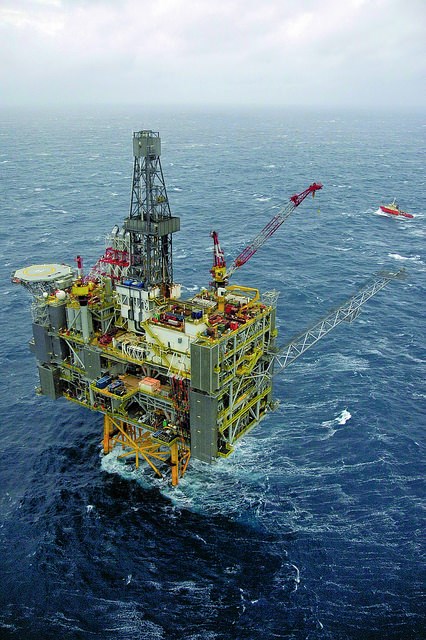
‘Steel’ the prize: Competition aims to usher in innovative ideas to improve the circularity of Scottish oil and gas infrastructure
In a partnership between Zero Waste Scotland and The Royal Society for the Encouragement of the Arts, Manufacturers and Commerce (RSA), students are being invited to reimagine how structural steel from decommissioned oil and gas platforms could be given a new lease of life.
Alongside Scottish Enterprise, Zero Waste Scotland is a headline sponsor of the competition, which comes with a cash prize of £2,000, and has partnered with the Scottish Government, Construction Scotland Innovation Centre and Decom North Sea.
In the UK, most of the steel from decommissioned oil and gas platforms is exported to Europe and beyond for smelting. The recycling of steel in this way produces a significant amount of carbon emissions and requires large-scale transportation of heavy materials. On top of that, the production of virgin stock puts pressure on the Earth’s natural resources and comes with a carbon cost.
The competition challenges university students to apply circular economy principles and propose ideas to repurpose steel, instead of relying on recycling. The reuse of existing materials would save carbon emissions, retain material value and stimulate the local economy.
Charlotte Stamper, Partner for Energy Infrastructure at Zero Waste Scotland, said: “Developing a circular economy in Scotland will help to protect our country against resource shortages and the rising cost of materials. This is particularly important as we transition away from fossil fuels. The existing infrastructure contains valuable materials that can be used again, in its current form, for other purposes.
“By working in partnership with The RSA, the next generation of the workforce will be more adept at placing the circular economy at the heart of every project. Developing green skills in education will help us meet our climate targets and realise a circular economy.”
One of the key principles of the circular economy is to keep existing products and materials in use for as long as possible. A circular economy is achieved by designing products smartly with their whole life cycle in mind, reusing and repairing to extend their useful life, and then when their life is deemed over, remanufacturing to create new products from old.
Oil and gas platforms have been built and used globally to access deep undersea reserves of petroleum and natural gas for years. Once the extraction project is complete, these platforms are retired or decommissioned in line with both international legislation as well as various regional and national maritime agreements.
The RSA and Zero Waste Scotland North Sea Oil and Gas Rig Decommissioning and Reuse Opportunity Report highlighted the repurpose of steel tubulars and sections of the platforms as one of the most significant opportunities for innovation. In the UK alone, over 500,000 tonnes of steel will be removed from the North Sea over the next 10 years.
Andy McDonald, Head of Low Carbon Transition at Scottish Enterprise, said: "For Scotland to achieve its net zero targets by 2045 we must be creative and this project taps into the innovative minds of our future talent to reimagine rigs rather than recycle them.
“Over the next decade, up to £15.1 billion is expected to be invested in decommissioning activity and highlights the potential economic opportunities available. I look forward to seeing the ideas the students surface through this design competition that will provide a unique perspective on repurposing steel from the energy industry and in turn inspire future circular economic solutions.”
Joanna Choukeir, Director of Design and Innovation at the RSA, said: "The RSA Student Design Awards challenges students to use their skills and creativity to tackle today's most pressing real-world issues. We believe applying circular design principles to the process of decommissioning oil rigs is crucial to preserving valuable material, creating green jobs and helping society shift our existing models to new circular ways of thinking. We are excited to see the range of creative and ambitious submissions students present in 2022."
Contact Information
Elaine Walker
Notes to editors
About Scottish Enterprise
Scottish Enterprise is Scotland's national economic development agency. We’re committed to growing the Scottish economy for the benefit of all, helping create more quality jobs and a brighter future for every region. Follow us on Twitter at http://twitter.com/scotent and https://twitter.com/ScotEntNews Follow us on LinkedIn at https://www.linkedin.com/company/scottish-enterprise/
About Zero Waste Scotland
Zero Waste Scotland exists to lead Scotland to use products and resources responsibly, focusing on where we can have the greatest impact on climate change.
Using evidence and insight, our goal is to inform policy, and motivate individuals and businesses to embrace the environmental, economic, and social benefits of a circular economy.
We are a not-for-profit environmental organisation, funded by the Scottish Government and European Regional Development Fund.
More information on all Zero Waste Scotland’s programmes can be found at https://www.zerowastescotland.org.uk/. You can also keep up to date with the latest from Zero Waste Scotland via our social media channels - Twitter | Facebook | LinkedIn For ZWS media enquiries contact:Sophie Thirkell, Communications Consultant, Zero Waste Scotland / Email: sophie.thirkell@zerowastescotland.org.uk
The Scottish Government is the Managing Authority for the European Structural Funds 2014-20 Programme. For further information visit our website or follow @scotgovESIF.
